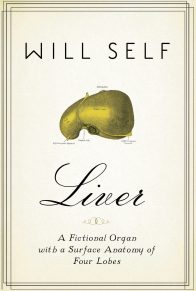Oh she was high as they flew nowhere in particular in Ted’s white Ford with the harelip fender. Her dirty blonde hair whipped around her face. A single strand caught on her tongue as she sucked the sweet pot smoke. Her lungs tightened and she coughed a little, ran one finger down her cheekbone and set the taut hair free, then pressed the joint into the ashtray. Tears swamped her vision and the car swelled gently around her. The light changed from red to a textured leaflike green, as if life itself gestated behind the curve of glass. It was a sign for her to levitate off the seat, slip out the window and fly up, like a piece of paper caught in a whirlwind, high over this place until the houses looked like strings of Christmas lights and the mall a Middle Eastern mecca.
Ted turned his head from the road and grinned.
He liked watching pot wing her back into a kid philosopher, when she spent whole days lying on her bed figuring how the earth got here, or wondering if raindrops could be souls falling from the gutters of heaven.
Beside the highway on a treeless hill, between Gold’s Gym and the black glass Allstate building, was her father’s new church. Ted said the cross on top of the pie-shaped building looked like a satellite fallen from the sky. Her dad’s car was parked near the trash Dumpsters, overflowing now with altar flowers, limp gladiola and brown carnations. He was writing tomorrow’s sermon, pen poised on the yellow legal pad, willing an angel to guide his hand across the page. He’d scribble for a while, then look up at the bronze bust of Martin Luther. Sip cold coffee. When she was little he’d write about her funny questions. “Was Santa God’s brother?” “Was heaven on the moon?” Now he’d decided she’d fallen out of God’s favor, he never actually said it, but she could tell in the way he always spoke to her in his church voice, the same officious tone he used with the trustees and the ladies’ guild.
Ted turned onto Brandy Lane, dipped beneath the underpass. Cool air rushed in the window and the car tugged out of the dark into a stretch of scrubby pine, a trampled, trash-filled forest, but still charming to her in its familiarity. Her house was in the subdivision just beyond the trees and she’d played in these woods as a child, knew the spot where bloodleaf grew near a dogwood tree and the mossy niche in a covey of rocks where you could keep dry in the rain.
She put her hand over Teds’ crotch, felt his rubbery cock tighten. That’s what she was after, the dumb thrust of life, like the films on PBS that showed a seed sprouting, peeking through the dirt and lifting itself up. A tiny wet spot bled through the denim–that first pearl of come. She smiled slyly at him and he rolled his eyes in a way that meant You’re too much. From this side his profile was normal; you couldn’t see where the flesh had been torn away or any hint of the thick keloid scar.
Looking back at the tree line, she saw puzzle pieces of rusty brown through the blue-gray branches. Kids, Ginger figured, pretending to be bank robbers or Indians, squatting in the underbrush trying to think like wolves. But the rich patches of color moved quickly and a deer ran out of the woods, all elegant animal grace, weightless and otherworldly. Its antlers grew up into the heavens and knocked down some stars and the deer trampled on them with graceful indignation. The animal’s ribs pressed out urgently as it stepped like a zoo animal, depressed and indifferent, onto the road.
“Oh fuck!” she said, and saw from the corner of her eye Ted rear back, his knee straightening as he slammed on the brakes. There was a dull thud, then the sickly sound of blood splattering over the windshield like a burst of puddle water heavy with mud. Her body slammed against the door as the car spun sideways. Black tree branches, the blood on the windshield, and the midnight-blue sky figured and refigured into patterns, as obvious and elusive as a kaleidoscope.
The radio blared. She watched her hand reach out and turn the knob to the left, and the music was gone. Ted cracked the door, rushed onto the pavement, and paced around the front fender, his hands deep in his pockets. He looked small, thin-shouldered, and slight in his unbuttoned black and blue flannel shirt and white T-shirt. She slid over the vinyl seat, came out the open door, and walked to where he stood. The deer was enmeshed with the grill and right fender, grown out of the car like some freakish mammalian extension. Its eyes looked up into the twilight and its mouth was open and filling slowly with pale pink foam.
“What are we going to do?” she asked.
Ted looked up the road to the highway, then down the embankment into the woods. “I’ll drag it down there,” he motioned to the trees, then bent over and picked up a cracked Slurpee cup from the scorched roadside weeds and pushed it against the deer’s glass-splattered belly. “I guess it’s dead,” he said, jabbing the cup harder into the fur of the deer’s long throat. The neck suddenly shifted and the deer pulled its head back, tried to focus its eyes on them.
Ginger screamed and grabbed Ted’s jacket, pulling him away from the animal. Its front legs beat the air and the effort sent a stream of blood rushing off the fender; the foam moved out of the deer’s mouth with the soft sound of soap bubbles popping.
“Jesus,” Ted said, holding Ginger as she leaned against the car and gagged up mouthfuls of warm beer. She puked on the pavement until her stomach was empty and there was just a sour taste of yeast in her mouth.
“It’s gotta be fucking dead now,” Ted said, adding an edgy nervous laugh, holding his hands over its wide nostrils. “I don’t feel any breathing. ” The deer was still and she watched him stick the cup into the skin of the animal’s belly, then throw it behind him, place his hands on the ankles–where the black hoof met with fur and yank the deer, its skin ripping like cloth, until it flopped sloppily into a puddle of its own blood.
Ted’s chest heaved. The muscles in his neck stood out like rope. He jerked the body over the gravel shoulder, then onto the grassy incline where it crushed blades of grass and smeared them with blood.
“Pull the car over,” he yelled, “and wait for me.”
The urgency in his voice made her run to the car, get in, and slam the door. Ginger turned the ignition key and the engine sputtered to life. She shifted into drive and let the wheels roll forward onto the soft shoulder, then pressed the button on the steering column that squirted blue fluid up over the blood until the window was clear and the wipers forced rose-colored water to collect along the bottom of the glass and flow down the sides. A few small circles of blood remained above the wiper’s range, but they were tiny and dark and could easily be mistaken for mud.
She watched the red alternator light flicker, just a short, Ted always said, but it showed how every object was taking on a life of its own, until the steering column had an agenda, as did the backseat and the fast-moving wheels. An empty Bud can jangled at her feet, possessed by wind from the window.
Lately her nervous system seemed like the control center of her body, anxiety shot through her, made her heart pound and the baby hairs stand straight on the nape of her neck. Maybe it was all the talk about the serial killer captured a few weeks back, how he kept chopped-up human bodies carefully wrapped in butcher’s paper in his basement freezer. Every day you heard about another grisly murder, and there were always mug shots on the news of the dead-eyed perpetrators and blurry snapshots of their victims smiling on Florida vacations or standing near a Christmas tree. Worry, like cornsmut boils, had grown along the ridges of Ginger’s brain until she suspected her body ran on fear alone. She had a bad habit of chewing her cuticles, peeling off strips of opaque flesh around the fingernails, and lately she slept only intermittently, jolted awake by every truck on the highway.
Used to be she could talk herself down by recounting unfathomable odds, imagine one bottle cap on a whole beach full of sand or a tiny star a million light-years away. She didn’t know anybody who’d died in a plane crash, or even a car crash. But then she did know a girl who’d been raped–some old guy trapped her in a Hardee’s bathroom and did it to her in the stall–and then last summer a dead girl was found floating in the man-made lake. Every night for a week, the local news showed a close-up of a tattoo on her thigh, a red cross encircled with blue ivy. The mushy water-soaked skin broke apart like wet paper. No one ever came to identify her and Ginger overheard someone at church say she was probably a prostitute from California, one of those throw-away types nobody cared whether they lived or died.
Then there was Sandy Patrick. Xeroxed copies of her school picture were up on the bulletin board at the supermarket, taped inside store windows at the mall, even on the occasional light pole along the highway. Ginger had studied the girl’s face, her stiff smile and worried eyes. It was the sort of expression Ginger associated with trying to be cheerful when you really want to cry. Just last week somebody found a photograph in a convenience-store parking lot the next state over. An underexposed Polaroid showed Sandy lying on a mattress, her arms tied behind her back, black electrical tape sealing her mouth. Her eyes were closed, so it was hard to tell whether she was dead or just sleeping.
What was taking so long? She saw bits and pieces of ranch houses through the thin strip of woods, sliding doors tinted blue with TV light, bright kitchen windows and murkier bedroom ones. Ted stood in a shadowed patch of trees and she watched his dark silhouette. His hand moved up to his mouth, the tip of the cigarette brightened from orange to red. Probably covering the deer with dead leaves and broken branches, that would be like him, trying to give the thing some dignity. Better than anybody she knew, he understood ritual, how it made you feel better and appeased the gods.
She watched him stand and walk through the trees toward the car. Dried leaves rattled and he broke from the woods and skittered up the slope carrying something white that held light like a sheer scarf. Ginger swung the door open for him and slid over to the passenger side. He leaned in, laid the plastic shopping bag gently beside her, then sat down and started the car, pushed in the lighter, clicked on the radio, fiddled with the dial until he got the metal station, and turned the music up loud. Metallica cranked. His expression was strained and there was something false and dramatic in the way he pulled his Marlboros from his jacket pocket and knocked out a cigarette, matched the tip with the orange coils of the car lighter. Blood was smeared on the bag and she could see the strands of brown fur pushed against plastic. The deer’s face came to her slowly, as if rising from polluted water. He pulled the car onto the road and made a wide U-turn back toward the highway.
“You are one sick fuck,” she said as she picked up the bloody bag, twisted around, and threw it behind her. The tip of one bony antler rubbed against her wrist. The severed head bounced on the backseat and landed with a fleshy thud on the rubber floor mat. Ted’s face was flushed and his thick keloid scar filled with blood.
He patted her knee and tried to say something but his speech was slurred, garbled like it had been right after his accident, before he adjusted to the new angle of his jaw and the knotty scar tissue embedded in the soft inside of his cheek. When he came to in the hospital, his face was a collage of gauze and purple bruises. In baby talk he told how the night had been so cold everything was covered with a fine geometric frost. And right before he passed out, his breath became so solid and white, he thought his soul was escaping. But the particulars, where he’d gotten the gun, why he’d been driving around at five in the morning, and who’d been with him, these things he refused to tell her.
“Well, aren’t you going to say anything?” she asked.
“About what?”
“That thing,” she motioned to the backseat. Ginger waited to see if he’d answer, but Ted’s face was blank and unreadable. The car got quiet; each atom of air grew sullen and mysterious. They passed Orchard Brook Mall. It was an ugly building, the moon a better place for it, not that it was modern but because of its windowless melancholy. And there wasn’t a stream in sight, unless they were referring to the drainage ditch along the highway. Ginger had spent her entire adolescence roaming around the fountain and plastic plants, breathing the endlessly recycled air.
Behind the mall the old highway looped downtown toward the boarded-up movie theater, vacant storefronts, and the drugstore that sold porno videos, three for ten dollars. There was still a drive-thru bank and Bamberg’s, a big failing department store where heavily made-up ladies sold strange, antiquated merchandise like panty girdles and dusty, cat-eyed sunglasses. Ted turned right, accelerated past the endless parade of strip-mall franchises–the Western Sizzler, Domino’s Pizza, and Blockbuster video then turned down the dirt road toward the dump. The tires bounced over mud holes, past riprap and loamy back fill. Headlights shined over the kudzu-covered maples, made each leaf look shellacked. He stopped near a grove of burnt-out tree stumps and turned off the engine. He got out and opened the back door, lifted the deer’s head, and carried the bag with two hands, solemn and ceremonial as an acolyte. She followed him down the hard dirt path, past a pile of tread-bare tires and the carcass of a water-stained mattress. There was smaller stuff too, cracked plastic toys, one like a car’s dashboard with a tiny rubber steering wheel. Bits of paper scattered over everything like dreary confetti.
The barn came into sight. “Everything will be cool once I get it all set up,” he said, already way in front of her, stomping fast in long, loose strides, leaving her alone in a fairy circle of greasy-looking trees.
Copyright ” 1997 by Darcey Steinke. Reprinted with permission from Grove Atlantic, Inc. All rights reserved.













